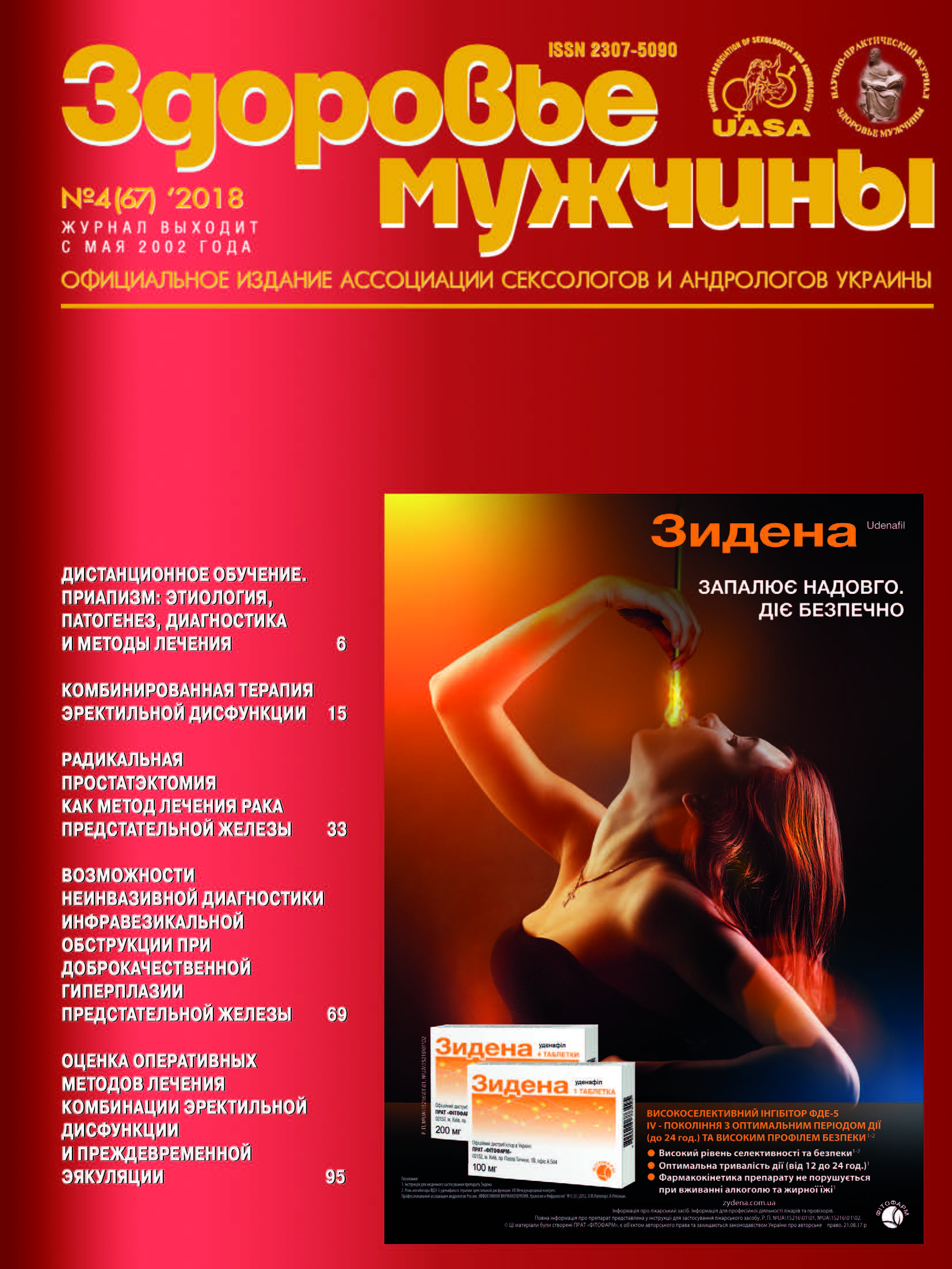Improving the Efficacy of Treating Excretorytoxic Infertility with the Use of Combined Immunomodulation
##plugins.themes.bootstrap3.article.main##
Abstract
The revealed features of the immune response in patients with various forms of infertility indicate their pathogenetic significance in reproductive function disorders. This is especially true for patients with excretory-toxic genesis of infertility, the activation of a humoral link of immunity which is associated with a lack of cellular link. Such data theoretically substantiate the expediency of prescribing immunomodulatory drugs in the complex treatment of such patients. The analysis of the results showed that clinical recovery was observed in 88 (59.45%) patients, improvement of laboratory parameters – in 41 (27.7%), absence of positive effect – in 19 (12.83%) of the subjects. During the microscopic examination of the secretion of the prostate gland before and after treatment, a significant decrease in the leukocyte response was observed: in the third group, from 84.3±6.1 to 14.1±1.7, in the IV group – from 79.7±5.5 to 16.1±4.1. In a controlled trial of ejaculate 3 months after the end of therapy, the number of sperm in 1 ml increased from 34.56±3.87 to 57.09±4.64 inthe third group and from 37.94±5.04 to 40.41±3.82 ingroup IV, the mobility increased from 27.69±4.01 to 47.33±2.31 and from 29.03±3.22 to 36.27±3.28, respectively, the number of live was increased from 38.92±3.47 to 46.93±3.48 inthe third group and from 36.88±4.01 to 40.18±2.48 inthe IV group, the number of pathological forms decreased from 46.35±3.27 to 24.382.92 inthe third group and from 48.30±4.29 to 39.89±3.92 inthe IV group.
Integrated immunomodulatory therapy in patients with excretorytoxic infertility has demonstrated its effectiveness in 94.6% of patients, which is confirmed by reliable changes in the parameters of the concentration of sperm, their mobility and the content of pathological forms.##plugins.themes.bootstrap3.article.details##

This work is licensed under a Creative Commons Attribution 4.0 International License.
Authors retain the copyright and grant the journal the first publication of original scientific articles under the Creative Commons Attribution 4.0 International License, which allows others to distribute work with acknowledgment of authorship and first publication in this journal.
References
Черных В.Б. Синдром персистенции Мюллеровых протоков (обзор литературы) / В.Б. Черных, Л.Ф. Курило // Пробл. репродукции. – 2001. – № 4. – С. 20–24.
Халафян А.А. Современные статистические методы медицинских исследований / А.А. Халафян. – 3-е изд. – М.: ЛЕНАНД, 2014. – 316 с.
Хоржевський В.В. Визначення механізмів розвитку порушень функціональності сім’ї за безпліддя у чоловіків / В.В. Хоржевський // Мед. психологія. – 2014. – № 1. – С. 93–98. PDF
Хромосомные аномалии при нарушениях сперматогенеза / Е.Г. Требка, А.Л. Маркевич, О.В. Прибушеня [и др.] // Здравоохранение. – 2014. – № 5. – С. 4–12.
Цитогенетическое обследование супружеских пар, включенных в программы вспомогательных технологий / Ж.И. Глинкина, Л.Н. Кузьмичев, В.В. Мамонова [и др.] // Акушерство и гинекология. – 2010. – № 3. – С. 39–42.
Чернова Н.И. Совершенствование терапии цитомегаловирусной инфекции у мужчин / Н.И. Чернова, Ю.Н. Перламутров, С.В. Стовбун // Клин. дерматология и венерология. – 2016. – № 3. – С. 48–52.
Bachir B.G. Infectious, inflammatory, and immunologic conditions resulting in male infertility / B.G. Bachir, K. Jarvi // Urol. Clin. North Am. – 2014. – Vol. 41, N 1. – P. 67–81. https://doi.org/10.1016/j.ucl.2013.08.008
Bacterial prostatitis / F.M. Wagenlehner, A. Pilatz, T. Bschleipfer [et al.] // World J. Urol. – 2013. – Vol. 31, N 4. – P. 711–716. https://doi.org/10.1007/s00345-013-1055-x
Berga S.L. Social determinants of infertility: beyond the obvious / S. L. Berga // Fertil. Steril. – 2016. – Vol. 105, N 6. – P. 1459–1460. https://doi.org/10.1016/j.fertnstert.2016.03.046
Bilateral but not unilateral testicular hypotrophy predicts for severe impairment of semen quality in men with varicocele undergoing infertility evaluation / A.K. Wu, T.J. Walsh, S. Phonsombat [et al.] // Urology. – 2008. – Vol. 71, N 6. – P. 1114–1118. https://doi.org/10.1016/j.urology.2007.12.074
Blyth E. Guidelines for infertility counselling in different countries: is there an emerging trend? / E. Blyth // Hum. Reprod. – 2012. – Vol. 27, N 7. – P. 2046–2057. https://doi.org/10.1093/humrep/des112
Boivin J. Evolution of psychology and counseling in infertility / J. Boivin, S. Gameiro // Fertil. Steril. – 2015. – Vol. 104, N 2. – P. 251–259. https://doi.org/10.1016/j.fertnstert.2015.05.035
Centola G.M. Determination of male infertility: is the 2010 WHO reference range helpful or confusing? / G.M. Centola // Fertil. Steril. – 2012. – Vol. 98, N 6. – P. 1416–1417. https://doi.org/10.1016/j.fertnstert.2012.08.029





